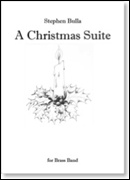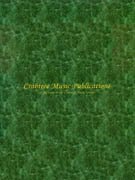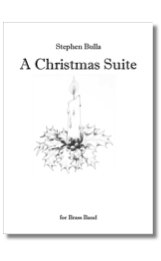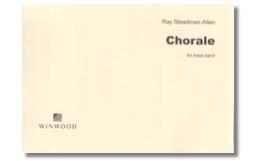Results
-
 £50.90
£50.90BLUEBERRY HILL (Brass Band) - Rose, Vincent - Fernie, Alan
Medium/Easy
Estimated dispatch 7-14 working days
-
 £137.95
£137.95CABARET CONCERTO (Piano Solo with Brass Band - Score and Parts) - Ellerby, Martin
Includes: Harmony in Green and Rose; Variations in Pink and Grey; Nocturne in Blue and Silver; An Orange Note; Arrangement in White and Black (Cornet Solo); Caprice in Purple and Gold; symphony in White; Harmony in Blue. Duration: 20:00. Recorded on Polyphonic QPRL231D TERRA AUSTRALIS
Estimated dispatch 7-14 working days
-
 £48.95
£48.95CHRISTMAS SUITE, A (Brass Band) - Bulla, Stephen
First published in 1984, this has always been a popular work for brass bands all over the world. This new edition is now available with a full score. Lasting about eight minutes, the three movement suite includes settings of Wassail Song, Lo, how a rose e're blooming, and to finish a 'Pot-pourri' bursting with tunes and energy.
Estimated dispatch 7-14 working days
-
 £37.95
£37.95HOLIDAY FOR STRINGS (Brass Band) - Rose, David - Farr, Ray
Estimated dispatch 7-14 working days
-
 £57.50
£57.50HOLIDAY FOR TROMBONES (Trombone Trio/Brass Band) - Rose, David - Freeh, Mark
Trombone Trio (or Section) and Brass Band. Duration: 4:00 Grade: Medium
Estimated dispatch 7-14 working days
-
 £50.90
£50.90ON A LITTLE STREET IN SINGAPORE (Brass Band) - De Rose & Hill - Smith, Sandy
Medium/Easy
Estimated dispatch 7-14 working days
-
 £59.99
£59.99Pasadena (Brass Band - Score and Parts)
This piece takes you on a journey to the sunny Californian city of Pasadena. The piece reflects two contrasting aspects of the city,. Firstly the serene expressive side with exquisite statues, works of art and sun drenched villas and secondly the hot Latin side with the street parade which leads up to the famous American Football final in the Rose Bowl stadium. 05:30
Estimated dispatch 7-14 working days
-
The Crown of Roses - Tchaikovsky - Len Jenkins
Tchaikovsky wrote this in his 'Songs for Young People' in Moscow in 1883 to words by Pletchtcheev. The story it tells is about Jesus Christ when he was a young child, having a small wild garden in which roses grew. Passing children saw the roses and plucking them mockingly asked if he wove rose garlands in his hair. Christ says to take the roses, but to leave the thorns. Instead, they make a crown of these and forced it onto his head so that it bleeds, symbolic of what was going to happen later in his lifetime. The melody contains all the passion that we associate with Russian church music and is equally suitable for a contemplative Christmas or Passiontide. This arrangement is faithful to the four verses of the original lyrics, but with an optional ending half-way if preferred.
-
 £49.95
£49.95A Christmas Suite (Score and Parts) - Stephen Bulla
The three-movement suite begins with the jaunty Wassail Song. The second movement is a wonderful version of Lo, how a rose e're blooming while the final movement is a bustling Pot-pourri with hints of several Christmas favourites. This new edition features a freshly engraved A4 size full score and parts and is compatible with the first edition.
Estimated dispatch 7-9 working days
-
 £32.00
£32.00Chorale (Score only) - Ray Steadman-Allen
Chorale is a set of variations based on an old carol tune, Es ist ein' Ros' entsprungen (There is a Rose that Bloometh). After an introduction the theme is presented followed by four variations and a finale; thoughout, thou, there is a genereal pervasive sense of the chorale's presence.
Estimated dispatch 7-9 working days
